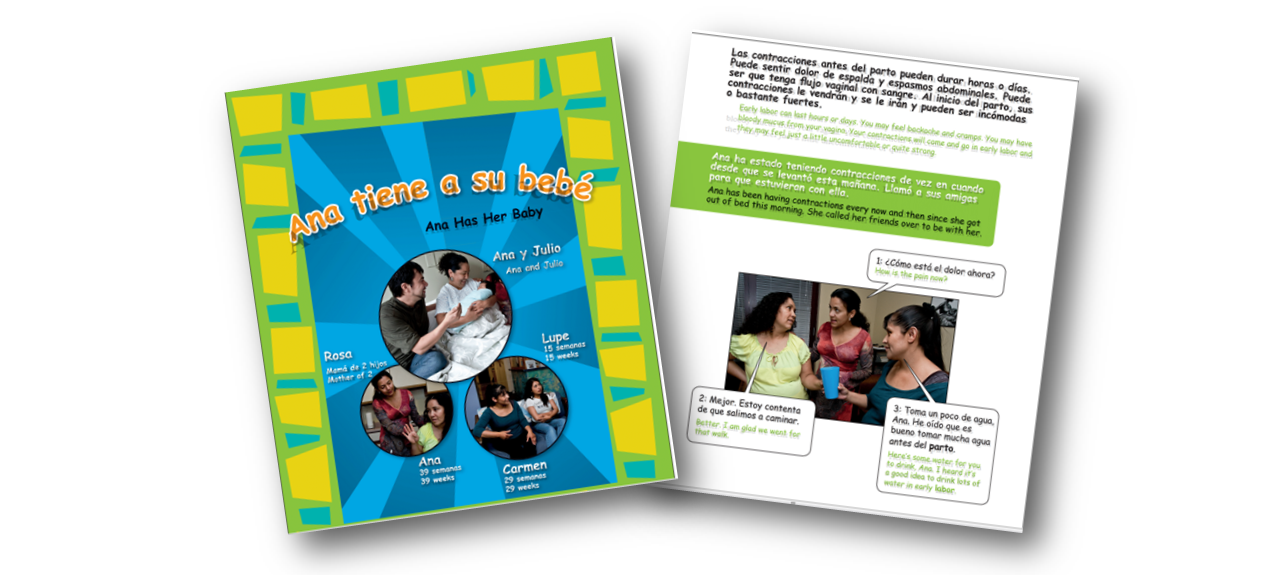De Madre a Madre: Lay Health Educators Reach Out to Help Hispanic Women Successfully Navigate Pregnancy
Pregnancy and caring for newborns can be daunting times of life for new mothers, with unanticipated challenges and obstacles. For the 11 million Hispanic women in their childbearing years in the United States this can be overwhelming as they are twice as likely to receive late or no prenatal care than non-Hispanic white women are.
A grant from the National Institute on Minority Health and Health Disparities (NIMHD) augments those resources, supporting a program that provides educational groups for Hispanic women using the De Madre a Madre prenatal care photonovels to help guide them through pregnancy, childbirth, and postnatal experiences. Photonovels, which are similar to comic books but illustrated with photographs, are popular in Mexico and Latin America.

With El Pueblo, Inc., an advocacy group for Latinos in Raleigh, North Carolina; the University of North Carolina Center for Maternal and Infant Health; and a national community advisory board, Dr. Susan Auger, president of Auger Communications, Inc., developed and tested an education program based on the Teach-With-Stories Method™. Lay educators facilitated groups of pregnant and postpartum Hispanic women in collaboration with local clinics.
As North Carolina’s former State Training Coordinator for Women’s Health, Dr. Auger assessed the needs of North Carolina’s local health departments to help build the state’s capacity to serve the rapidly growing Hispanic population. She saw the importance of helping Latinas and the lack of culturally and linguistically appropriate services and materials.
Since the 1990s, when the concept of health literacy began to emerge, Dr. Auger has studied what makes interventions and programs transformative. As a social worker with interests in health literacy, cultural competency, and empowerment, she saw the need to establish programs that could more effectively reach and engage these women and help pave the way for successful pregnancies, healthy babies, and flourishing families.
During a national search for bilingual education materials, Dr. Auger learned about the use of “photonovels” (or fotonovelas) for outreach efforts to Hispanic communities about domestic violence and the prevention of HIV/AIDS and other sexually transmitted infections. She began developing this type of media for prenatal care and expanded its use from information dissemination to group education through the Teach-With-Stories Method. Combining storytelling with cycles of action and reflection cultivates skills and a culture of lifelong learning, she noted.
The Teach-With-Stories photonovel curriculum “taps into the potential of this marginalized community and provides a bridge to the healthcare community,” Dr. Auger explained. The program uses promotores as facilitators. Promotores are lay health educators who provide specialized education in Hispanic communities and have a personal understanding of their communities’ history, sociocultural context, experiences, challenges, and strengths. Promotores meet with groups in an environment of caring, mutual respect, and shared power. Participants explore issues such as seeking prenatal care, when to go to a clinic, when to call 911, and other steps to take as their pregnancies progress, labor begins, and their babies are born.
The groups, which vary in size from about 8 to 12 women, usually meet weekly for 7 weeks, with sessions that last 90 to 120 minutes. Dr. Auger estimated that the program has now reached hundreds of pregnant women. An important underpinning is that the facilitators do not function as didactic experts. Participants are actively engaged. The photonovel is read out loud by participants like a play, so that everyone can participate regardless of reading ability. The facilitators periodically stop the presentation to discuss the story.
“We are creating spaces in communities where people can come together for social support,” Dr. Auger said. “This is important, especially for pregnant women. We now know factors like stress, isolation, and trauma can impact pregnancy and the health of a fetus in utero.”
Teach-With-Stories is part of the Small Business Innovation Research/Small Business Technology Transfer Program (SBIR/STTR), which encourages small businesses to engage in research and development projects that have a potential for commercialization. Dr. Auger applied for and received an NIMHD SBIR grant to develop the Teach-With-Stories program for implementation in communities. Phase 1 of the grant, from 2007 to 2008, explored the program’s feasibility, and phase 2, from 2010 to 2014, developed and pilot-tested its effectiveness. This research builds on a decade’s worth of preliminary studies in clinic settings.
“The women benefit, the facilitators benefit and are able to use the experience and their participatory facilitation skills in other areas of their lives, and the mom’s healthcare providers benefit,” she said.
The De Madre a Madre Prenatal Care photonovel series includes seven stories, inspired by actual experiences of Latinas during pregnancy and childbirth. The main characters are three friends who are in different stages of pregnancy. They support each other through the joys, problems, and practical issues that arise during this time. Each photonovel contains key prenatal health messages related to a specific topic: pregnancy, going to the clinic, nutrition, risks, labor, breastfeeding, and first week with baby. The photonovels are in Spanish paired with English translations.

In a published evaluation of the program, Dr. Auger and her colleagues described a cascade of positive outcomes. The 43 participants they assessed “showed a significant increase in their knowledge of pregnancy, childbirth, and breastfeeding and a significant increase in confidence at being able to navigate their pregnancies, care for themselves and their babies, and interact with health professionals. They reported an increase in social support, a deeper understanding of information from medical providers, greater engagement, and behavior changes.”
The evaluation concluded that the program fostered health literacy and empowerment and maintained good medical outcomes, with a slight increase in the number of prenatal visits and decrease in cesareans and hospitalizations. With appropriate support and training, lay health educators were able to effectively facilitate the groups.
One participant quoted in the evaluation commented, “There’s more time, more trust [in the program], and from one question comes another. That wouldn’t come up if I was alone with the doctor.” Another observed, “I feel more sure of myself to ask questions.”
“Many of the women talked about feeling more comfortable in asking for what they needed, developing a birth plan, feeling more empowered, and being able to breastfeed,” said Florence Simán, director of health programs for El Pueblo and a research team member. “Some had previous children they had not been able to breastfeed. In the past, they felt intimidated and that it wasn’t their place to ask questions.”
The project is now in the commercialization and marketing phase, Dr. Auger said, and has expanded beyond North Carolina to programs in Washington state and Louisiana. The intervention supplements individual prenatal care that participants receive at their local clinics. Dr. Auger feel that the approach of Teach-With-Stories can best be captured by this quote from quoting Mother Theresa: “‘Not all of us can do great things. But we can all do small things with great love.’” She adds, “At its heart, that’s what this program is doing. I can’t help but be optimistic. The positive outcomes and ripple effects have been so consistent.”
Posted March 30, 2018

















